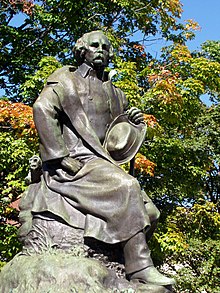Puritans believed the Devil was as real as God. Those who follow Satan was considered witches. Witchcraft was one of the greatest crime a person can commit and is punishable by death. During the Salem Witch Trials about 24 or 25 people died either from being put to death or died in prison.
Nathaniel Hawthrone was born in 1804 in Salem, Massachusetts. He is actually related to a judge name Judge Hathrone, who was a judge in the Salem Witch Trials. Hawthorne's works belong to dark romanticism (cautionary tales that suggest that guilt, sin, and evil are the most inherent natural qualities of humanity). Many of his works were inspired by Puritan New England. He's mostly a short story writer but he also wrote some nonfiction. He died in May 19, 1864 , in Plymouth, New Hampshire. After his death his friend, Longfellow wrote a tribute poem to Hawthorne, published in 1866, called "The Bells of Lynn."
The Puritans influence our modern society in many ways. They made a virtue of qualities that made for economic success—self-reliance, frugality, industry, and energy—and through them influenced modern social and economic life. Their concern for education was important in the development of the United States, and the idea of congregational democratic church government was carried into the political life of the state as a source of modern democracy.
Interesting fact: Edgar Allen Poe once accused Nathaniel Hawthrone's Twice-Told Tales and Mosses from an Old Manse of plagarism.
 |
| Statue of Nathaniel Hawthrone |
If the Puritans were so successful during their time in incorporating the morals of the Church into political affairs, what made them think the humans were able to follow them strictly? Although through their uses of severe punishments to enforce moral perfection, why is it still that some people would commit the sins or even revolt them? This question relates to how still in our government, moral issues are considered before passing laws but should that be taken into account when people still break the laws but punished less severely nowadays?
ReplyDelete